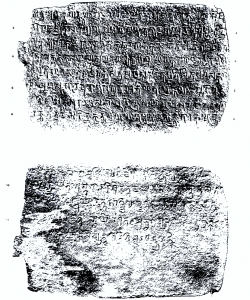
1-6) The year is 100 (and) 20 (and) 4, (the month) Phālguna, the day 7, while Paramadaivata Paramabhaṭṭārakkamahārājādhirāja, the prosperous Kumāragupta is the lord of the earth; and while the Koṭivarsha district is running on with (the rule of) Cirātadatta, an Uparika of the Puṇḍravardhana province, selected by His (Majesty’s) feet; and while Kumārāmātya Vetravarman, appointed by him (Cirātadatta), is administering the Board of the town presiding over the Nagara- śreṣṭhin Dhṛtipāla, the sārthavāha Bandhumitra, the prathama-kulika Dhṛtimitra (and) the prathama-kāyasthaSāmbapāla.
6-9) whereas the Brāhmaṇa Karpaṭika has applied: “Deign to make over a strip of wasteland, unploughed (and) not yielding (anything), for being used for my agnihotra rites, at the rate of three dīnāres a kulyavāpa, to be enjoyed (by me) for ever, as long as the moon, the sun and the stars (endure), in accordance with nīvīdharma;
9-11) It being resolved that it might be granted, one kulyavāpa (of land) was given (him) on acceptance of three dīnāres in the region north-west of Ḍoṅgā according to the determination of the record-keepers, Riśidatta, Jayanandin and Vibhudatta.
12) The stanzas connected with grants of land are:
Verse 1) “He, who takes away land given by himself or by others, having become a worm in excreta, rots with his forefathers.”